I. Introduction
A. Definition of the Great Filter
1. Concept Overview
The Great Filter is a theoretical concept that suggests there is a stage in the evolutionary process that is extremely difficult for life to surpass. This stage could occur at any point from the emergence of life to the development of advanced civilizations capable of interstellar communication and travel.
-
Stage: Any critical phase in the development of life
-
Difficulty: Extremely challenging to surpass
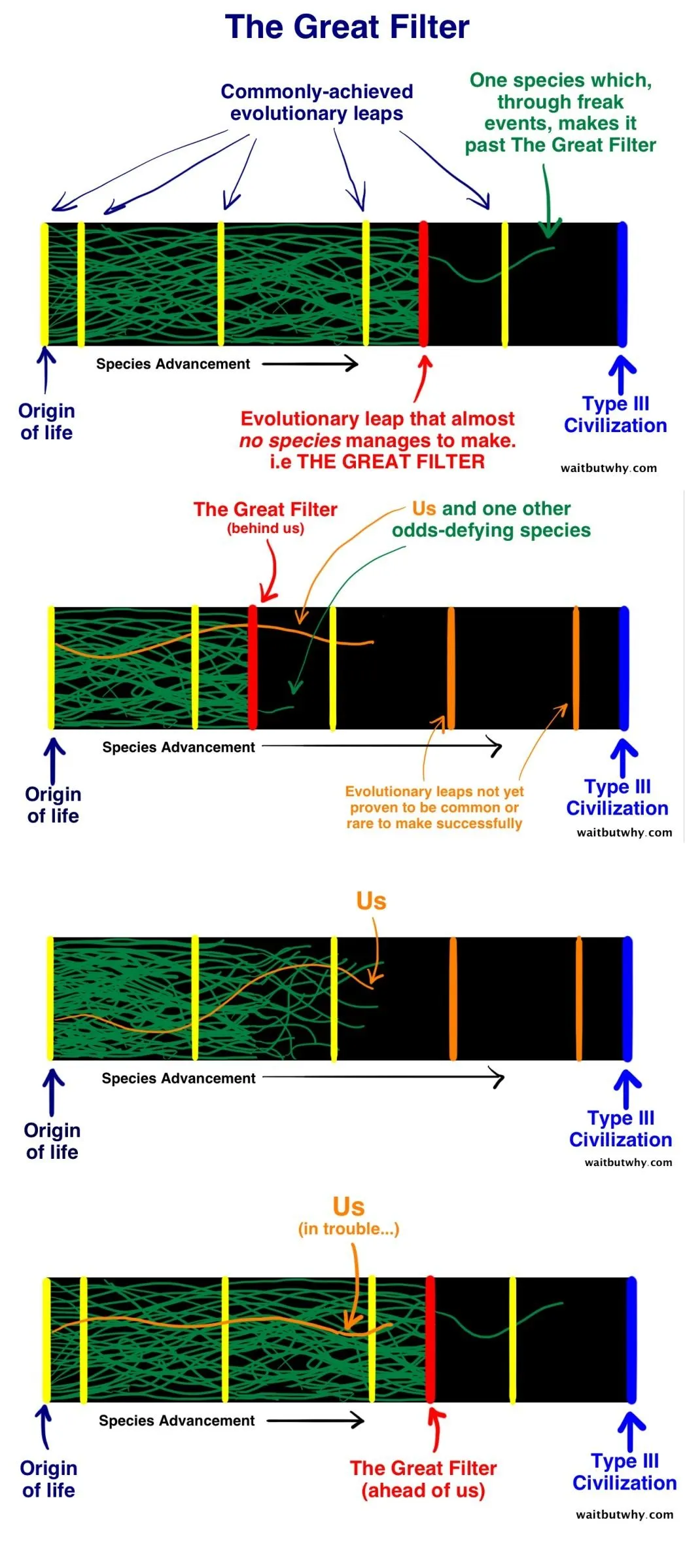
2. Relation to the Fermi Paradox
The Great Filter theory is closely related to the Fermi Paradox, which questions why, given the high probability of extraterrestrial civilizations, we have not yet detected any signs of their existence.
-
Fermi Paradox: The apparent contradiction between the high probability of extraterrestrial life and the lack of evidence
-
Connection: The Great Filter provides a possible explanation for the scarcity of detectable extraterrestrial civilizations
B. Importance of Understanding the Great Filter
1. Implications for Humanity
Understanding the Great Filter has significant implications for humanity, as it helps us assess the challenges we have overcome and those that lie ahead. It can inform our strategies for survival and guide our efforts to avoid potential existential risks.
-
Assessment: Evaluating our progress and potential future challenges
-
Survival Strategies: Informing efforts to avoid existential risks
2. Scientific Significance
The Great Filter is scientifically significant as it provides a framework for understanding the rarity of advanced life and guides research in astrobiology, evolutionary biology, and existential risk studies.
-
Framework: Understanding the rarity of advanced life
-
Research Guidance: Informing studies in astrobiology, evolutionary biology, and existential risks
C. Structure and Objectives of the Article
1. Historical Background
The article will begin with a historical overview of the Great Filter theory, including its early concepts and speculations, the formal introduction by Robin Hanson, and the evolution of the theory through contributions from various scientists and researchers.
-
Early Concepts: Initial thoughts on extraterrestrial life and its scarcity
-
Formal Introduction: Robin Hanson’s formulation
-
Evolution: Contributions from various scientists and researchers
2. Scientific Explanations
The article will delve into various scientific explanations for the Great Filter, exploring stages such as abiogenesis, the evolution of simple to complex life, the development of intelligence, the emergence of technological civilizations, and long-term sustainability and survival.
-
Abiogenesis: The origin of life from non-living matter
-
Complex Life: Transition from single-celled to multicellular organisms
-
Intelligence: Evolution of cognitive capabilities
-
Technological Civilizations: Industrial and technological advancements
-
Sustainability: Environmental and ecological stability
3. Potential Scenarios and Great Filters
The article will explore multiple potential scenarios and Great Filters, including pre-life filters, early life filters, complex life filters, intelligent life filters, technological civilizations filters, and interstellar communication and exploration filters.
-
Pre-Life Filters: Rare Earth Hypothesis, chemical and environmental challenges
-
Early Life Filters: Formation of replicating molecules, stability of early life
-
Complex Life Filters: Transition to multicellularity, development of eukaryotes
-
Intelligent Life Filters: Evolution of brain complexity, cognitive and social development
-
Technological Civilizations Filters: Industrial revolutions, potential self-destruction
-
Interstellar Filters: Challenges in interstellar travel and communication
By outlining these key sections, the article aims to provide a comprehensive understanding of the Great Filter theory, its scientific foundations, and the potential scenarios that could explain the rarity of detectable extraterrestrial civilizations.
II. Historical Background of the Great Filter Theory
A. Early Concepts and Speculations
1. Enrico Fermi and the Fermi Paradox
Enrico Fermi’s famous question, “Where is everybody?” encapsulates the Fermi Paradox. Despite the high probability of extraterrestrial life, we have no evidence of their existence. Key points include:
-
High Probability of Life: Given the vast number of stars and planets, many believe that intelligent life should be common.
-
Lack of Evidence: We have not detected any signs of extraterrestrial civilizations.
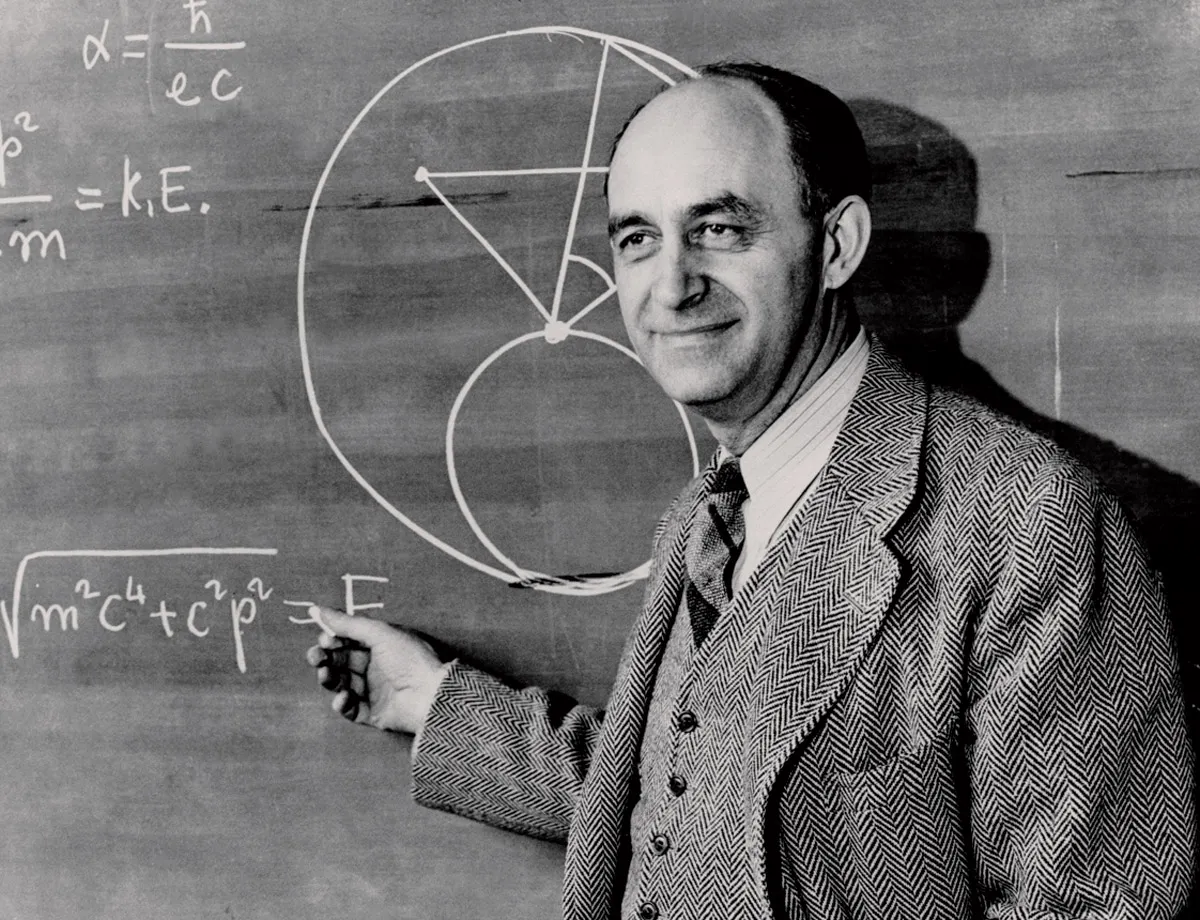
2. Initial Thoughts on Extraterrestrial Life and Its Scarcity
Early thoughts on extraterrestrial life considered both the possibility of life and the reasons for its apparent absence:
-
Drake Equation: A probabilistic argument used to estimate the number of active, communicative extraterrestrial civilizations.
-
Rare Earth Hypothesis: Suggests that the emergence of complex life requires a rare combination of astrophysical and geological conditions.
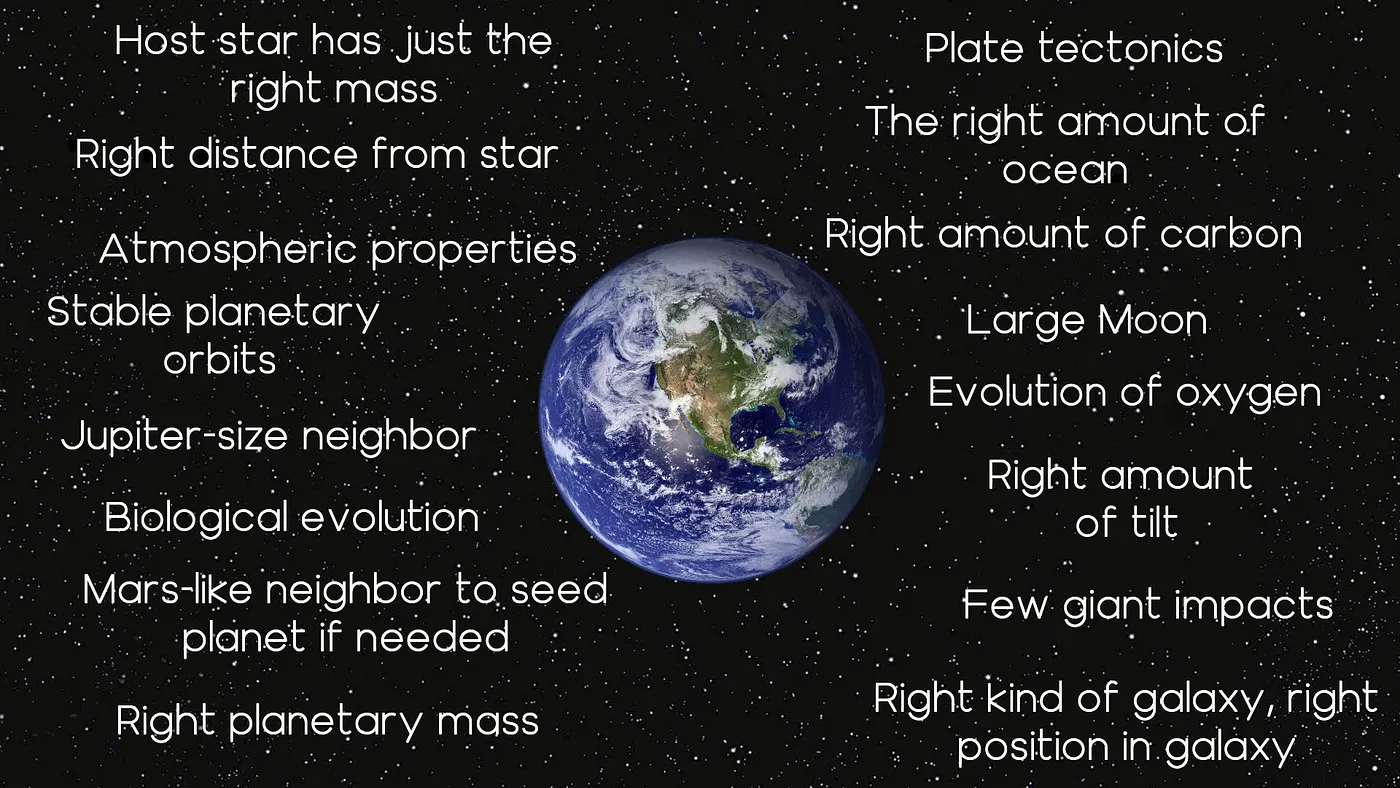
B. Formal Introduction of the Great Filter
1. Robin Hanson’s Formulation
Robin Hanson introduced the Great Filter concept in 1996, proposing that one or more stages in the development of life are highly improbable. Key ideas include:
-
Early Filters: Stages in the emergence of life (e.g., abiogenesis).
-
Late Filters: Stages in the development of advanced civilizations (e.g., avoiding self-destruction).

Robert Hanson
Robert Hanson is considered to be the grandfather of The Great Filter and has written several publications regarding the theory.
2. Key Publications and Developments
Hanson’s work spurred further research and publications, enhancing our understanding of the Great Filter:
-
Hanson, R. (1996) — “The Great Filter — Are We Almost Past It?”
-
Bostrom, N. (2002) — “Existential Risks: Analyzing Human Extinction Scenarios and Related Hazards.”
C. Evolution of the Theory
1. Contributions from Various Scientists and Researchers
The Great Filter theory has evolved through contributions from numerous scientists and researchers:
-
Astrobiologists: Exploring the conditions for life beyond Earth.
-
Philosophers: Discussing the ethical and existential implications.
2. Popularization and Impact on Scientific Discourse
The Great Filter has significantly impacted scientific discourse, influencing research and public interest:
-
Publications and Media: Books, articles, and documentaries on the Fermi Paradox and the Great Filter.
-
Scientific Research: Increased funding and interest in astrobiology and existential risk studies.
IV. Possible Scenarios and Great Filters
A. Pre-Life Filters
1. Rare Earth Hypothesis
The Rare Earth Hypothesis suggests that the emergence of complex life requires a combination of astrophysical and geological conditions that are rare in the universe. These conditions include:
-
A planet located in the habitable zone of its star.
-
A stable climate over geological timescales.
-
The presence of liquid water.
-
Protective factors like a large moon and a magnetic field.
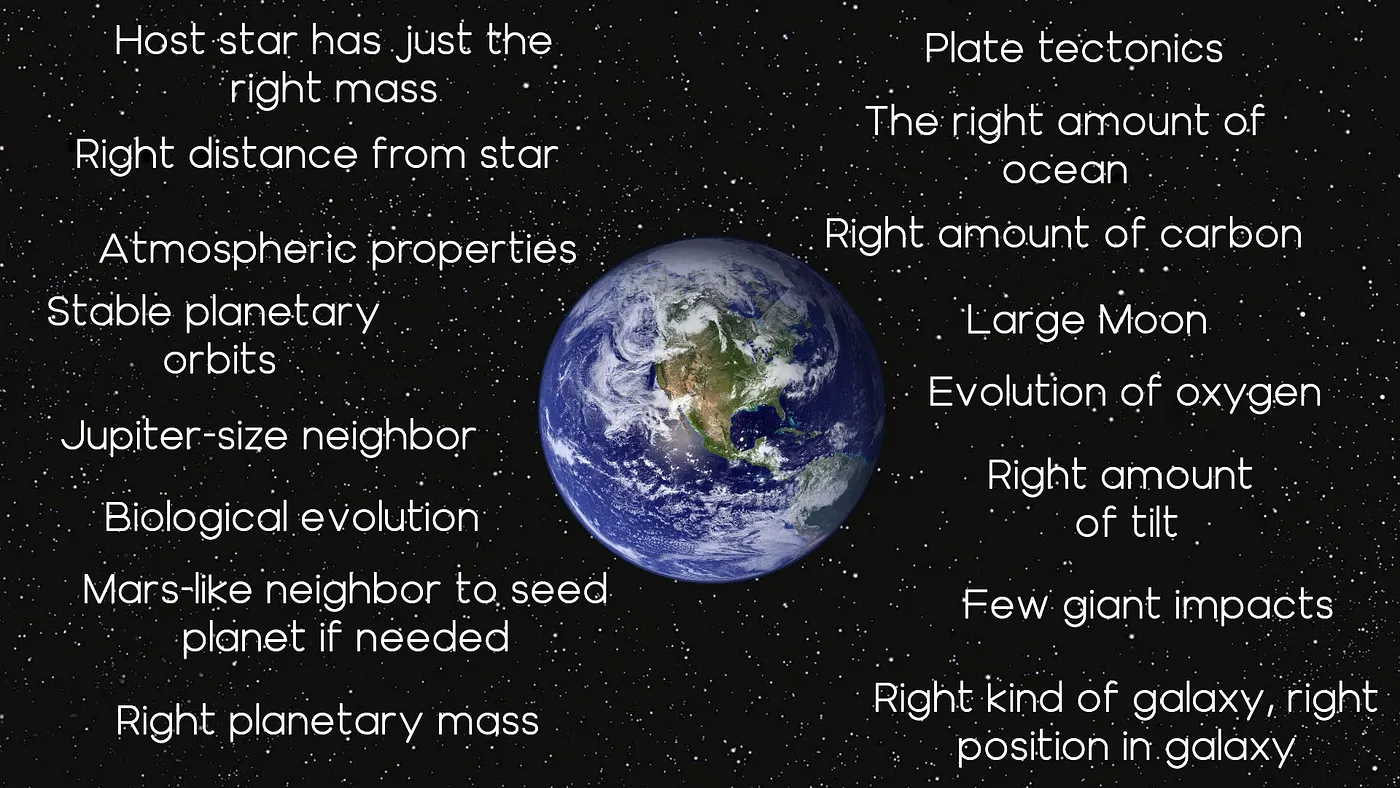
2. Challenges in Chemical and Environmental Conditions
The formation of life depends on specific chemical reactions and environmental conditions. Challenges include:
-
Availability of essential elements like carbon, hydrogen, nitrogen, oxygen, phosphorus, and sulfur.
-
Energy sources to drive chemical reactions.
-
Suitable temperature and pH levels.
B. Early Life Filters
1. Formation of Replicating Molecules
The first step in the development of life involves the formation of self-replicating molecules, such as RNA. This process faces several hurdles:
-
Chemical pathways for the synthesis of nucleotides.
-
Mechanisms for replication and error correction.
2. Stability and Survival of Early Life Forms
Once life emerges, it must be stable and capable of surviving harsh conditions. This involves:
-
Adaptation to environmental changes.
-
Protection from harmful radiation and chemical damage.
C. Complex Life Filters
1. Transition from Prokaryotes to Eukaryotes
The evolution from simple prokaryotic cells to complex eukaryotic cells is a significant leap. Key features include:
-
The development of organelles like mitochondria and chloroplasts.
-
The evolution of complex cellular processes.

2. Development of Multicellularity
The transition to multicellular organisms involves:
-
Cell specialization and differentiation.
-
Mechanisms for cellular communication and cooperation.
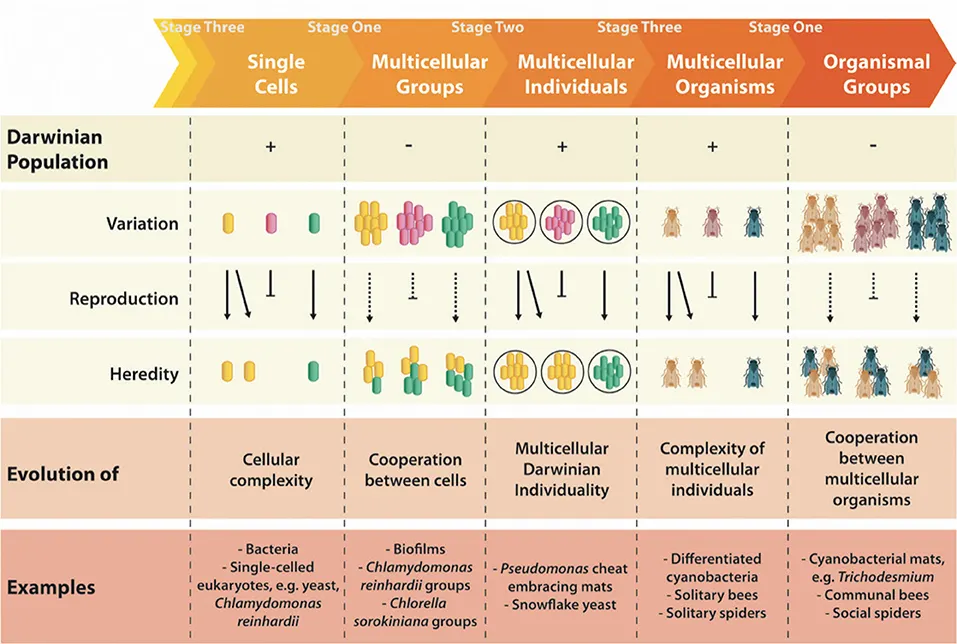
D. Intelligent Life Filters
1. Evolution of Brain Complexity
The development of intelligence requires the evolution of complex brains. Factors include:
-
Increased brain size and neural complexity.
-
Evolution of sensory and motor systems.
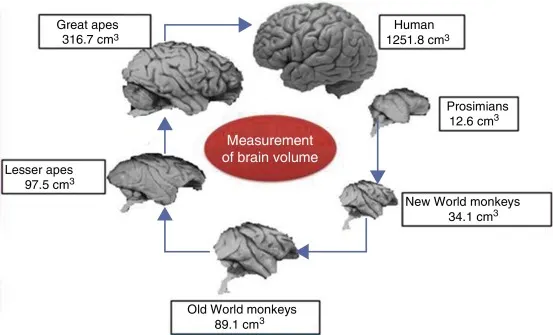
2. Cognitive and Social Development
Intelligent life must develop advanced cognitive and social capabilities:
-
Problem-solving and abstract thinking.
-
Development of language and culture.
E. Technological Civilizations Filters
1. Industrial and Technological Revolutions
The emergence of technological civilizations involves:
-
The development of tools, machinery, and infrastructure.
-
Rapid advancements in science and technology.
2. Potential Self-Destruction
Technological civilizations face risks of self-destruction, such as:
-
Nuclear war.
-
Environmental collapse due to over-exploitation of resources.
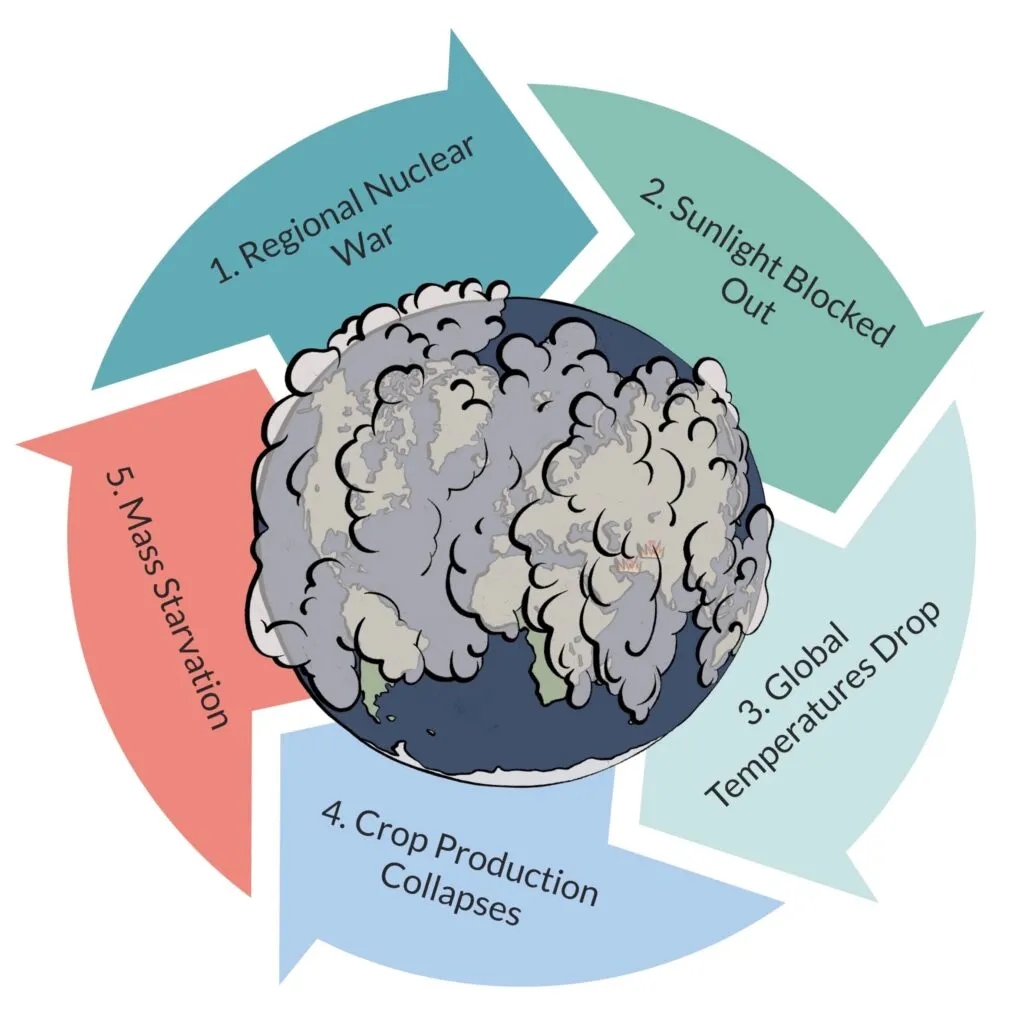
F. Interstellar Communication and Exploration Filters
1. Challenges in Interstellar Travel and Communication
Interstellar travel and communication present significant technical challenges:
-
Vast distances and energy requirements.
-
Communication delays over light-years.
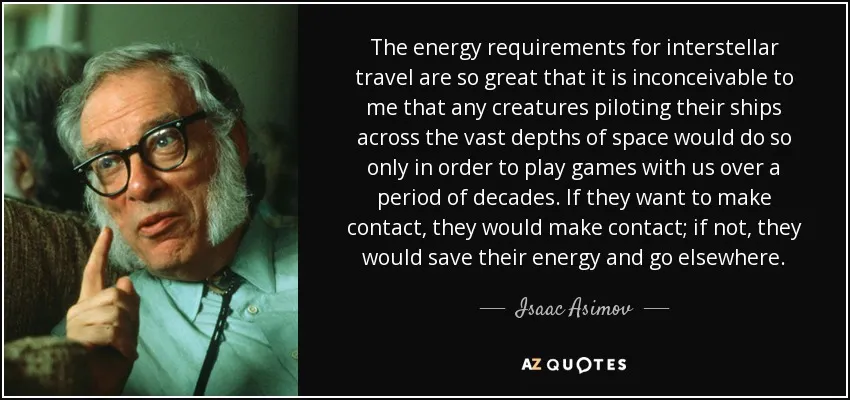
2. Detection and Sustainability of Extraterrestrial Civilizations
Even if advanced civilizations exist, detecting them and ensuring their sustainability is difficult:
-
Developing and maintaining advanced technology.
-
Avoiding catastrophic events that could lead to their extinction.
V. Implications and Future Research
A. Implications for Humanity
1. Assessing Our Current Position in Relation to the Great Filter
Understanding the Great Filter helps us assess where humanity stands in the evolutionary timeline. This involves evaluating our achievements and vulnerabilities, and determining whether the most challenging barriers lie behind us or ahead.
-
Current Achievements: Technological advancements, societal structures, and environmental awareness.
-
Vulnerabilities: Potential for self-destruction, environmental degradation, and resource depletion.
2. Potential Risks and Strategies for Survival
Identifying potential risks associated with the Great Filter is crucial for developing strategies to ensure humanity’s long-term survival. Key strategies include:
-
Risk Mitigation: Addressing existential threats such as nuclear war and climate change.
-
Sustainability: Promoting sustainable practices to preserve resources and the environment.
-
Scientific Research: Advancing scientific understanding to overcome future barriers.
B. Ongoing and Future Research
1. Astrobiology and the Search for Extraterrestrial Life
Astrobiology plays a crucial role in understanding the Great Filter by exploring the conditions necessary for life and the potential for its existence beyond Earth. Key research areas include:
-
Planetary Exploration: Missions to Mars, Europa, and other celestial bodies.
-
Exoplanet Studies: Identifying habitable exoplanets using telescopes and space missions.
-
Biosignature Detection: Developing technologies to detect signs of life in the atmosphere and surface of other planets.
2. Technological Advancements and Their Impact on the Great Filter
Technological advancements can both mitigate and introduce new Great Filters. Key areas of focus include:
-
Artificial Intelligence: Potential benefits and risks associated with AI development.
-
Space Exploration: Advancements in propulsion, habitats, and life support systems.
-
Biotechnology: Innovations in genetics, medicine, and sustainability.
C. Philosophical and Ethical Considerations
1. Ethical Implications of Contact with Extraterrestrial Civilizations
The potential discovery of extraterrestrial life raises significant ethical questions. Considerations include:
-
Moral Responsibility: Ensuring respectful and non-exploitative interactions.
-
Cultural Impact: Understanding and mitigating the impact on human societies.
-
Rights and Protections: Establishing rights and protections for extraterrestrial entities.
2. Responsibility Towards Future Generations and Planetary Stewardship
Our actions today have profound implications for future generations and the health of our planet. Key responsibilities include:
-
Sustainable Development: Ensuring sustainable practices to preserve the environment.
-
Education and Awareness: Promoting education and awareness about existential risks and sustainability.
-
Intergenerational Justice: Ensuring that future generations inherit a habitable and thriving planet.
VI. Conclusion
A. Summary of Key Points
1. Historical Development of the Great Filter Theory
The Great Filter theory has evolved from early speculations by Enrico Fermi and the formulation by Robin Hanson to a central concept in astrobiology and the study of extraterrestrial life. Key historical developments include:
-
Enrico Fermi’s Question: Highlighting the paradox of the absence of detectable extraterrestrial civilizations.
-
Robin Hanson’s Contribution: Introducing the formal concept of the Great Filter and its potential stages.
-
Scientific Contributions: Ongoing research and theories by various scientists exploring the different stages of the Great Filter.
2. Scientific Explanations and Potential Scenarios
The Great Filter theory encompasses various stages of life’s development, each posing significant challenges. These include:
-
Abiogenesis: The origin of life from non-living matter.
-
Evolution of Simple to Complex Life: Transition from single-celled to multicellular organisms.
-
Development of Intelligence: Evolution of cognitive capabilities and social structures.
-
Technological Civilizations: Emergence and sustainability of advanced technological societies.
-
Interstellar Communication: Challenges in detecting and communicating with extraterrestrial civilizations.
B. Final Thoughts and Reflection
1. The Significance of the Great Filter in Our Understanding of the Universe
The Great Filter is a profound concept that shapes our understanding of life’s rarity and the potential challenges in the universe. It highlights the difficulties in reaching advanced stages of development and the potential existential threats that civilizations face. The Great Filter also provides a framework for evaluating the likelihood of other civilizations and the steps humanity must take to avoid potential filters.
2. The Importance of Continued Exploration and Scientific Inquiry
Continued exploration and scientific inquiry are essential for addressing the questions posed by the Great Filter. This includes:
-
Astrobiology Research: Investigating the conditions for life on other planets and moons.
-
Technological Advancements: Developing new technologies for space exploration and sustainability.
-
Philosophical and Ethical Studies: Reflecting on the implications of contact with extraterrestrial life and our responsibilities toward future generations.
VII. Appendices
A. Key Terms and Definitions
B. Timeline of Major Developments in the Great Filter Theory
C. List of Influential Publications and Researchers
Influential Publications
-
Robin Hanson (1996) — “The Great Filter — Are We Almost Past It?”
-
Nick Bostrom (2002) — “Existential Risks: Analyzing Human Extinction Scenarios”
-
David Grinspoon (2003) — “Lonely Planets: The Natural Philosophy of Alien Life”
-
Stephen Webb (2002) — “Where Is Everybody?: Fifty Solutions to the Fermi Paradox and the Problem of Extraterrestrial Life”
Influential Researchers
-
Robin Hanson — Economist and originator of the Great Filter concept.
-
Nick Bostrom — Philosopher known for his work on existential risks.
-
David Grinspoon — Astrobiologist and author on the search for extraterrestrial life.
-
Stephen Webb — Physicist and author exploring solutions to the Fermi Paradox.
D. Additional Resources for Further Reading
-
Books
-
“The Eerie Silence” by Paul Davies
-
“Life 3.0: Being Human in the Age of Artificial Intelligence” by Max Tegmark
-
“The Exoplanet Handbook” by Michael Perryman
-
Articles
-
“The Great Silence: Science and Philosophy of Fermi’s Paradox” by Milan M. Ćirković
-
“The Search for Extraterrestrial Intelligence” by Jill Tarter
-
Websites
VIII. References
A. Comprehensive List of Cited Works
-
Hanson, R. (1996). “The Great Filter — Are We Almost Past It?” Retrieved from mason.gmu.edu/~rhanson/greatfilter.html.
-
Bostrom, N. (2002). “Existential Risks: Analyzing Human Extinction Scenarios and Related Hazards.” Journal of Evolution and Technology, 9(1). Retrieved from nickbostrom.com/existential/risks.html.
-
Grinspoon, D. (2003). Lonely Planets: The Natural Philosophy of Alien Life. Ecco.
-
Webb, S. (2002). Where Is Everybody?: Fifty Solutions to the Fermi Paradox and the Problem of Extraterrestrial Life. Copernicus Books.
-
Ćirković, M. M. (2009). “The Great Silence: Science and Philosophy of Fermi’s Paradox.” Astrobiology, 9(3), 201–213.
-
Tarter, J. (2001). “The Search for Extraterrestrial Intelligence (SETI).” Annual Review of Astronomy and Astrophysics, 39, 511–548.
B. Additional Recommended Literature and Resources
Books
-
Davies, P. (2010). The Eerie Silence: Renewing Our Search for Alien Intelligence. Houghton Mifflin Harcourt.
-
Tegmark, M. (2017). Life 3.0: Being Human in the Age of Artificial Intelligence. Knopf.
-
Perryman, M. (2018). The Exoplanet Handbook. Cambridge University Press.
Articles
-
Bracewell, R. N. (1960). “Communications from Superior Galactic Communities.” Nature, 186(4726), 670–671.
-
Hart, M. H. (1975). “Explanation for the Absence of Extraterrestrials on Earth.” Quarterly Journal of the Royal Astronomical Society, 16, 128–135.
Websites
-
SETI Institute — An organization dedicated to the search for extraterrestrial intelligence.
-
NASA Astrobiology Institute — A research institute focused on the study of life in the universe.
-
Exoplanet Exploration Program — NASA’s site dedicated to the discovery and study of exoplanets.